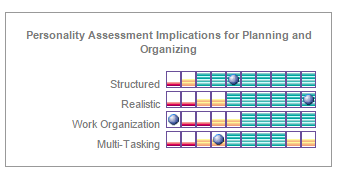Required to take a Assess Personality Survey and feeling anxious about it? Looking to get more information? JobTestPrep can provide you with information about the test, how to prepare, links to practice questions, how it’s scored, the interpretation of the results, and more. Empower yourself with the knowledge you need and go into your Assess Personality Survey as prepared as possible.
What Is the Assess Personality Survey?
The Assess Personality Survey is a personality test that indicates a job candidate’s core competencies and areas of concern for a given position. It has 350 questions measuring 16 personality characteristics (dimensions). Each dimension is comprised of competencies, and for each dimension, the critical qualities are interpreted and analyzed. The test highlights strengths and weaknesses of the candidate and makes recommendations to management about the candidate’s aptitudes, possible problem areas, as well as areas of particular talent.
One test that can help you, for example, is Caliper.
Understanding the Questions
Most questions on personality tests are really testing only a few different characteristics that are deemed important by the specific company and the job role. Once you can decipher what characteristics the test is actually testing, you can more easily determine how to approach the questions.
Studying with the Personality Test can help you.
Assess Personality Profile
The following are the 16 personality traits that are measured on the Assess Personality Survey:
- Assertiveness - The quality of being self-assured and confident without being aggressive.
- Cultural Conformity - Agreement between an individual's behavior and a group's standards or expectation.
- Emotional Evenness - Having calm emotions even when dealing with problems or pressure.
- Need to be Liked - An individual’s dependency on others for social acceptance.
- Work Pace - How fast an individual works and completes tasks.
- Organized/Structured - The ability of having one’s tasks in order so as to deal with them efficiently.
- Need for Attention - The degree to which one needs others to take notice of them.
- Need for Freedom - The degree to which one desires autonomy in the workplace.
- Detail Interest - The degree to which one gives attention to the nuances and specifics of a task.
- Objective/Factual - The degree to which one is not influenced by personal feelings or opinions in considering and representing facts.
- Positive About People – The degree to which one has optimistic beliefs about others.
- Serious/Restraint - The degree to which one is able to stay focused, have self-control, and not react under pressure.
- Realistic/Pragmatic - The ability to deal with things sensibly and realistically in a way that is based on practical rather considerations.
- Self-Reliance - The ability to depend on one's own powers and resources rather than those of others.
- Sociability - One’s degree of friendliness and interaction with others.
- Reflective/Probing - The degree to which one thinks about the decisions they make.
Understand the Scoring
The results are grouped in scales of 1-10. The ideal range of a given characteristic is marked in green; the neutral range is yellow and the non-ideal range is red. The dot is where the test taker falls on the spectrum. It’s important to realize that there isn’t “one” correct answer, but rather a range on a spectrum that employers are looking for. The results of the distinct measures are then aggregated to depict a portrait of the test-takers competencies and hindrances. The scales are strongly correlated to the Cattell 16PF and the CPI scales. The scales on the Assess personality survey also overlap with the Neo-PI-R model and the Five Factor Model.

(This image taken from the Assess Systems website)
Candidate Report Composition
Each of the 16 dimensions, which are comprised of a group of related characteristics, is analyzed to create a report about core competencies and areas of concern. For each competency, practical benefits and hindrances are extrapolated to create a comprehensive portrait of a candidate’s competencies and areas of concern.
Strategies and Tips
Tip #1:Think like a test-taker only
One aspect of the personality test that confuses many test-takers is that the questions can be answered differently based on the different roles one assumes in different aspects of life. It is important to answer the test questions in the role of an employee only. In this way, you can optimize your answers on the tests to the way you want to portray yourself for the job.
Tip #2: Time Yourself Right
Many test-takers get anxious when they know that a test is timed. While some personality tests are timed, you should have more than enough time to complete the test, even if it is timed. The goal of the test being timed is to prevent test-takers from spending too long on each question, which can be symptomatic of gaming the test.



